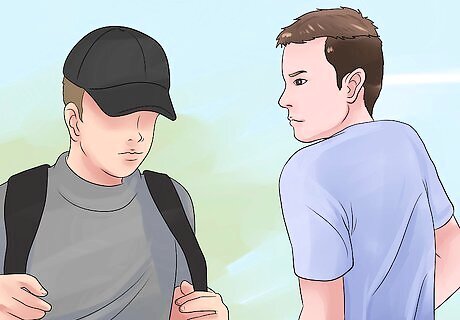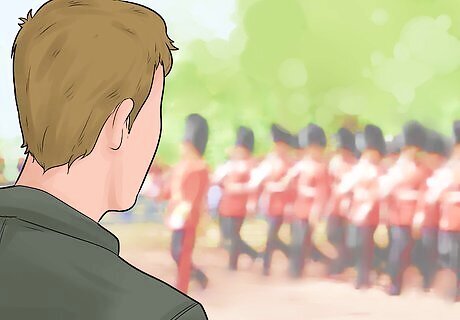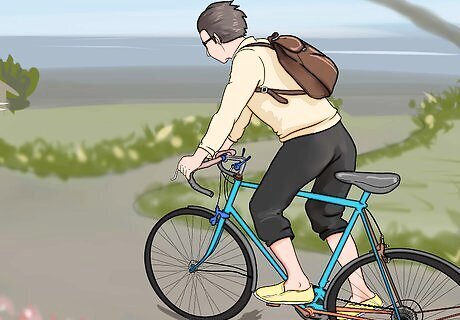
views
Fitting In

Conform to common attire. Mimic the style of the people around you. Similar to a group of soldiers, football players, or fireman, identifying an individual is difficult because they are all dressed alike. Aim to fit in with clothing choices around you. A great way to blend in and build rapport or trust within your community is to copy their behaviors and ways of doing things. Adapt to your environment by bringing a reversible jacket or a different colored undershirt for multiple options. Change color like a chameleon and fit into your surroundings. In a general setting without a like-minded group, aim for the middle-ground. Somewhere between the tightest and loosest clothes, between the brightest and most muted colors. Find a happy medium between neat and sloppy. Make sure if someone were to describe your appearance they'd also be describing several others in the group. Wear what others are wearing. The way we dress and say a lot about wanting to attract attention or not. People in specific locations and climates dress to their needs and local fashion. Find the trends and fashion most popular in your area and start fitting in.

Do what others do. Try to imitate the speech patterns, common lingo, and behaviors where you live. In other words, adopt local customs. If everyone in your area says, “Hi y’all!” as a normal greeting, practice your twang. In many Europe locations, for instance, counting on your fingers begins with the thumb. Therefore, if you want two of something, start with the thumb and then the index finger. Be comfortable even if someone is in your personal space. In Korea it's normal for male friends to physically be very close to one another. Personal space may be respected in America, but in some cultures it's not treated the same way. In Korea it's common for friends to hold hands, sit together closely, and be much closer than traditionally acceptable to Westerners.

Be mediocre. Avoid being the outright winner or loser of anything. While somewhat unhealthy to purposely throttle yourself, you certainly won’t gain notoriety for being average in every way possible. If you are finished with a test in class before anyone else, wait until others finish before putting your pencil down and leaving the room. When walking in a group of people, aim to be in the middle of the pack. If you're leading everyone is going to notice. If you're dragging behind, pick it up and get ahead of some people. Avoid being in charge. Authority is often despised, and rebellion to it is even part of our psychological makeup. Even when marooned with several strangers, it's important not to be seen as an authoritarian or as the person controlling affairs.
Managing Your Surroundings

Keep to yourself. One sure-fire way to avoid attention is to simply avoid interaction with others. There is a fine line, however, between keeping to yourself and being “Comstockian,” which is when people gain attention while trying to avoid it.

Adjust to your location. Think about who will be where you are going, what they will be wearing, how they will be acting, etc. This will help you decide how to best blend in with the people populating the area. If going into a business environment, find out if it’s a business-casual or business dress, and then dress appropriately. Dress in team colors if you’re going to be at a sporting event, but make sure you aren’t in the front row. You don’t want to end up on the jumbotron where extra attention could blow up in your face. You can even plan ahead for some sporting events and get tickets with less camera visibility. Learn the appropriate actions at an unfamiliar event. If going somewhere for the first time, know the customs beforehand. For instance, applause during movements is frowned upon during classical music.

Assimilate to event or location expectations. Learn team cheers, order the right drinks, speak the current lingo. Try to imagine what you look or sound like from other people's view, and work with that knowledge.
Manage Your Interactions

Minimize your actions. Do what everyone else is doing, but to a lesser degree. If everyone is laughing, chuckle; if everyone is crying, shed a tear. The key is to be subtle in all your actions.

Unplug from electronic communication. By not replying to others, you’ll avoid their current attention. Further, your lack of reply may likely cease other correspondence. Turn off your cell-phone. Avoid calls and texts the same. Set your voicemail to let everyone know you’ll be out of the loop for a while. Let emergency contacts know where you’ll be and how to reach you otherwise. Don’t check your personal email. Work email may be unavoidable, but personal email can wait. Set an “out of office” auto-reply, or pretend you’re on vacation. Log out of social networks. No tweets, snapchats, or facebook messages. Imagine you are trying to avoid revealing a show’s cliffhanger secret or the final score spoiler.

Keep personal interactions to a minimum. Try to avoid eye contact so people aren’t prone to engage you. Lack of eye contact signals inattentiveness and lessened interest. Try not to initiate conversation with anyone. If someone initiates with you, be polite but abrupt. Make it clear you wish to be left alone.
Coordinating Travel

Travel during non-peak times. Many mass-transit options provide their down times. Take advantage of this and try to minimize the number of people you may encounter.

Continue moving. When you are not in the same place very long there will be less time for people to notice you. Some studies suggest dissimilar movement hinders communication between two people. If you are at a crowded social gathering, casually walk from place to place as if you are trying to get somewhere.

Take shortcuts. If there is an alternate route to your daily routine, a less-populated pathway, attempt to literally choose the road less traveled.

Alter your travel patterns. A common security measure for someone under surveillance is to change up their travel routing. Try making a few small adjustments so that people who may be looking for you can’t peg down your whereabouts. Leave your house at a different time each day. It’s unlikely someone will wait extraordinarily long if you don’t leave at a consistent time. Change your route to normal daily locations. Try the interstate one day, side roads the next. The key is to make it more difficult for someone to perpetually be where you are. Make unexpected stops. Try going to a quiet library or coffee shop periodically. Go somewhere out of the ordinary on a whim. Be unpredictable so you are an unknown to those around you, and difficult to find for those who know you.




















Comments
0 comment